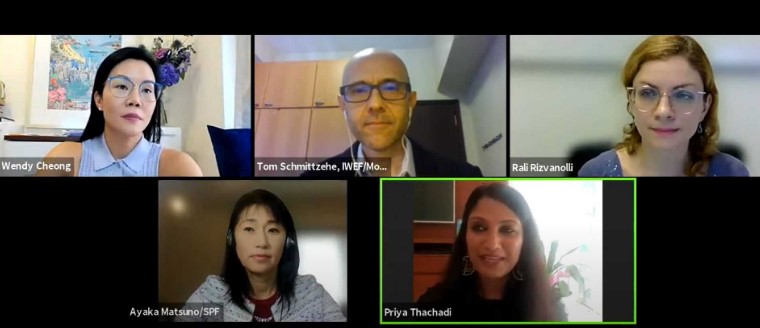The first question Ms. Thachadi posed to the panelists was about the challenges faced by women entrepreneurs in Southeast Asia.
In response, Ms. Cheong stated that unlike men, women entrepreneurs face greater initial challenges to starting businesses. For example, women often lack entrepreneurial and commercial experience and networks, and they are expected to manage their household and business in a limited amount of time. Furthermore, Ms. Cheong also identified the legal structure around women as a problem, citing different property rights for men and women in Laos and Indonesia, and claiming that this social context makes it difficult for women entrepreneurs to establish sustainable businesses.
Ms. Rizvanolli went on to say that while EMIIF Sarona Asset Management has been investing for over a decade, the number of female fund managers remains low. The fact that the company has become more risk averse than ever before, especially now that the Covid-19 pandemic has restricted business travel and other activities, making it more difficult to conduct due diligence. This is considered as a barrier for diversifying the company's investment portfolio, for example by investing in women entrepreneurs.
Citing the problem of the so-called "missing middle," Ms. Matsuno noted that small and growing businesses (SGBs), in which many women entrepreneurs are engaged in, are too large to qualify for microfinance, but too small to be a target for venture capitalists (VCs) and other private equity investments. This then creates a gap in the investment targets between the demand and supply of funds. She also mentioned about the
Beacon Fund that AWIF currently invests in. The fund was established to tackle this issue and solve the ‘missing middle’ in the available funding for women entrepreneurs. Additionally, Ms. Matsuno also highlighted unconscious bias against women as a problem, and introduced the
GLIA toolkit, a training kit with ideas and methods to help investors and technical support providers overcome unconscious bias.
Finally, citing the digital divide as a problem, Mr. Schmittzehe stated that as a result of the Covid crisis, many enterprises are migrating to the digital economy. However, the informal market, where many women entrepreneurs operate, makes that move extremely challenging.


